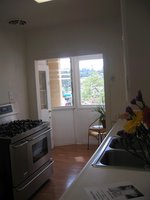Results Delivered with Style
Distress Sale Experts; Client-Centric Service; Innovative Marketing; Top Dollar Results
Hello to all my clients in:
Burbank, Toluca Lake, NoHo, Atwater Village, Downtown Los Angeles, Altadena, Eagle Rock, Silver Lake, Pasadena, Glassel Park, Elysian Valley, Hollywood Hills, Sherman Oaks, Valley Village, Studio City, Simi Valley, Santa Monica, West Los Angeles, Surrounding Los Angeles Areas & the OC.
Tuesday, January 24, 2006
You CAN Save For Your Future
Saving money is a basic concept of personal financial planning, and key to financial success. Yet many of us don't have a formal savings plan. Without such a plan, the chances of ever saving enough money to meet long-term financial goals or achieve financial security are very slim.
It seems simple. In order to save money, you need to have "extra" cash, right? This is a common misconception. Having a spending plan (aka "budget"), will help you create money for savings. Most of us, by setting spending goals, can manage to save regularly, so if you're tempted to hit your back button because you simply don't have enough money to have a formal savings plan, STOP! This article will tell you the "secrets" to savings.
First, set a few short-term and long-term financial goals to work towards, like a down payment on a car or home.
Include the dollar amount and a time frame for achieving the goal. It's much more motivating to save when you know what you're saving for. And remember, a goal that isn't written down is only a dream.
Set up a separate savings account. If you mingle your savings with your regular checking account, you'll almost certainly dip into your savings and may never pay them back. Having your savings in a separate account is a constant reminder that these funds are earmarked for your future, and watching the balance grow is rewarding and motivating.
If you don't already have a written budget that includes tracking your expenditures each month, begin one now. Whether you make thousands of dollars or hundreds of thousands of dollars a year, you need a budget. Budgeting can be relatively simple and entirely guilt-free. See Budgeting 101 for simple, easy budgeting.
Decide on a percentage of your gross income to designate as savings. 10% is a good starting point, but if you've developed a budget and have analyzed your spending and you honestly can't find a way to set aside 10% for your future, then start out with 8%, or 5%, or whatever you're able to do with perhaps a little bit of discomfort but without great sacrifice.
If possible, have your employer or your spouse's employer deduct a set amount from your paycheck each pay period and deposit it into your savings account automatically. The old adage "out of sight, out of mind" works well here. Having to transfer money to your savings account is a little like giving someone who is trying to quit smoking a cigarette to carry around in his pocket and expecting him not to light up. Why tempt yourself? Make it easy and increase your chances of success with automatic deposits or transfers.
Whenever unexpected money comes your way, put all or most of it into your savings account. Bonuses, salary increases, tax refunds, rebates, overtime pay, income from hobbies or yard sales and other windfalls can pump up your savings account nicely without requiring additional cutbacks.
If you're forced to dip into your savings for an emergency, consider it a loan which must be paid back in a reasonable period of time, and set up a repayment schedule.
That's all there is to it! The "secret" is that there's no magic involved. The key is to start now and stick to it.
Monday, January 23, 2006
10 Important Steps to Take Before You Sell Your House
The home selling process differs from state to state, but there are some important steps that most home sellers should take before listing a house with an agent or selling it for sale by owner. Every bit of prep work you do helps you get the most return from your investment.
1. Get Pre-Approved for a Home Loan
I've known sellers who signed a contract to sell their house before they knew if they were qualified to buy another. Either their financial circumstances had changed since their last purchase, and they could no longer qualify for a loan, or they weren't able to sell at a price that allowed them to buy the type of replacement house they wanted. They ended up renting or buying something that was far from ideal.
Before you decide to sell the house, get pre-approved by a lender you trust and research the housing market in the area where you wish to live so that you have a good idea how much it will take to buy a replacement. Start looking for two types of real estate: houses that seem to match the one you'd like to buy and houses that are similar to your current home. How do the two categories compare in price? Can you handle the difference if you're planning a step up?
2. Check Your Mortgage Payoff
Call your lender to check the payoff for your current home mortgage. You'll need the figure to complete Step 6.
3. Determine How Much Your House Is Worth
Determine your home's fair market value. Real estate agents will usually help you determine value as a courtesy, but you might take it a step further and order an appraisal.
4. Estimate Your Costs to Sell
- Real estate commission if you use an agency to sell.
- Advertising costs, signs, other fees if you plan to sell by owner.
- Attorney, closing agent and other professional fees.
- Excise tax for the sale.
- Prorated costs for your share of annual expenses, such as property taxes, home owner association fees, and fuel tank rentals.
- Any other fees typically paid by the seller in your area (surveys, inspections, etc.).
- Real estate agents deal with transactions every day and can give you a very close estimate of seller closing costs.
Calculate moving expenses, loan costs, downpayment, home inspections, title work and title policy, paying for a new hazard insurance policy--all expenses related to buying a home. Your lender should give you a disclosure of estimated costs when you apply for loan pre-approval.
6. Calculate Your Estimated Proceeds
Deduct your mortgage payoff from your home's fair market value.
Deduct your costs to sell from the remainder to get an estimate of the proceeds you will be paid at closing.
Will your closing proceeds cover your costs to buy a new home? If not, do you have cash or other funding to make up the difference?
7. Make Necessary Repairs
Make all needed repairs unless you want the house to be regarded as a fixer-upper. I'm not referring to cosmetic updates--just items in need of repair. Anything that's obviously broken gives potential buyers a reason to offer you a lower price, especially if it's one of several repair hot spots that worry buyers the most.
8. Get the House Ready to Show
Most houses need at least a little spiffing up before they are shown to potential buyers. Great curb appeal, fresh paint indoors (and sometimes out), organized closets and cabinets, sparkling clean windows and appliances and a clutter-free look are essential if you want the house to appeal to buyers. Be sure to avoid the things buyers hate most about houses.
9. Get Psyched Up to Let People In
If you're listing with a real estate agent, she'll ask you to leave when the house is shown. Why? Because lurking sellers make buyers nervous--they don't feel comfortable inspecting the house when they feel they are intruding in your personal space.
Unless there's a valid reason for it, don't ask your agent to be present for all showings, because that requirement can be the kiss of death for showing activity. Other agents want privacy with their buyers and they don't usually have time to work around your agent's schedule.
Make the house accessible. That means it should always be ready to show. Many agents won't bother showing a house that takes 24 hours to get into.
written by: Janet Wickell,
Your Guide to Home Buying / Selling.
COPING WITH RISING MINIMUM PAYMENTS
Have you heard the news?
Credit card minimum payments may be rising — in some cases even doubling — as of January 1, 2006. That’s great over the long run, potentially helping consumers reduce balances faster. But in the short term, the hiked minimum payments could leave you hurting. Read on to see how the rules have changed — and what you could do to soften the financial blow.
How It Used to Work
In the recent past, average credit card issuers set minimum payments at about 2 to 3 percent of the balance each month. In the worst case scenarios, that wasn’t enough to cover the interest charges incurred for the month. So even if you made on-time minimum payments and didn’t add charges, your balance could take years to pay off — particularly if your cards had high interest rates. For example, making 2 percent minimum payments on a $10,000 balance at 18 percent would require about 58 years to pay off.
How It Works Now
To help address the issue of consumer credit card debt, various federal agencies advised setting voluntary minimum payment guidelines that would help ensure each monthly payment made a dent in consumers’ credit card debt load. The result is that minimum monthly payments will likely be a minimum of about 1 percent of the principal balance plus any interest and fees incurred that month. So each minimum payment should not only wipe out the current interest charges and fees, but also go to paying down the balance.
What the Change Might Mean to You
Exactly what increase you may see on your credit card bill depends on multiple factors, including the credit card issuer, the interest rate, the existing minimum payment percentage and the balance. In a nutshell, the higher your credit card interest rate is, the lower your required minimum payment was before the change, the larger your balance is and the more cards you have with high balances, the more of an impact you’re likely to see. (Some minimum payments were already high enough and will not change.)
How You Can Soften the Blow
If higher monthly credit card minimum payments could cause you to feel a financial pinch, there are some steps you can take to help ease the pain.
Use credit wisely. Whenever possible, pay for purchases with cash or checks. Avoid using credit cards for quick consumables, such as meals, groceries or gas unless you can realistically pay off the credit debt within two months. Save up-front for big expenses, so you can buy them outright, or charge them and pay off the bill within a month, so you don’t accrue interest charges.
Trim your spending. For a month, track all the money you spend, from a fast-food lunch to weekend videos to the utility bill. Cut back on non-essentials and look for ways to reduce necessary expenses, such as making your home more energy efficient to reduce heating bills or carpooling to cut down on fuel costs. Use those saved dimes and dollars to help make your credit card payments.
Improve your credit score. Pushing your credit rating up may help you qualify for lower interest rates from lenders. Simple steps such as making sure your credit reports are accurate, using your credit wisely and paying all of your bills on time can improve your score.
Consider your credit options. Credit cards are handy, but they’re not always the best option when you encounter unexpected expenses, have a drop in income or need a safety net. Using the available equity in your home can sometimes be a wiser choice, since you’ll usually enjoy lower interest rates and, in most cases, that interest will be tax deductible. A cash-out refinance is one option to consider. It provides you with a lump sum of cash that you can use for any need, such as to pay off and consolidate credit card debt. After all, the best way to avoid hikes in minimum payments is to pay off the cards altogether. Plus, paying off multiple bills with a cash-out refinance leaves you with fewer bills to pay each month.
Ask for assistance. If you feel that your debt is simply more than you can manage, don’t be afraid to ask for help before you fall behind — but do be choosy about where you go for assistance. Avoid companies that charge a fee to “fix” your credit or that focus on declaring bankruptcy to “clear” your debts. Instead, opt for a reputable consumer credit counseling organization. Remember, too, that a Mortgage broker can help you with a variety of flexible lending options as well as answers to many of your finance questions, whether it’s related to a home purchase, refinance or home equity. For a free discussion concerning your options, call me at (818)521-3060, email me at tlbautista@aol.com or visit me online.
Tuesday, January 17, 2006
$725000 - 4 Units in NoHo Arts District/Detached One 1-Bedroom house w/ Three 2-bedroom units




NOT LISTED YET! CALL TODAY!
Superb Location. Great Value. Seller Motivated. Priced for quick sale.
One detached 1-bedroom house sits behind Three 2-bedroom units in a prime area of the trendy NoHo Arts District in North Hollywood. Clean, well maintained, some upgrades. Long Driveway. Just 5 blocks from the city of Burbank and down the street from the new Chandler Bike Path, this is truly an exceptional property.
This home with residential income units is an investor's dream in an excellent area, long-time tenants, well maintained buliding and lot's of upward potential. The street itself has seen some major improvements with newly built condominuims and housing.
NoHo is centrally located just minutes from the Studios in Burbank, just over the hill from Hollywood and walking distance to some of the best dining, shopping and entertainment in the valley. Close to FWY's (134, 101 and 170), minutes from Burbank Airport. Log onto: http://www.nohoartsdistrict.com/ for more info about the area.
DO NOT DISTURB TENANTS.
Call agent, Tricia Bautista at 818-521-3060 for showing info and address.
Tricia Bautista
Las Casas Realty
(818)521-3060
Visit http://www.soldinthecity.blogspot.com/ to see my other listings.
This property is at Denny Ave. at Magnolia
Thursday, January 12, 2006
Atwater Village 90039

This charming home has so much to offer with 3 bedrooms, 2.5 baths and plenty of space to live, grow and expand. Updated with new paint (inside and out), newly refinished, gleaming original wood floors and brand new carpert, this home is ready to move in and be personalized with your own touches.
Situated on a quiet street in the quaint neighborhood of Atwater Village sits a lovely 1926-built home. A colorful garden and sweet porch greet you as you walk up to the large wood door of this pretty cape cod-style home. Enter into the light and airy living room and you will instantly notice the soaring, wood-beamed cielings. Light pours into the picture window, hits the shiny wood floors and fills the room.

The authentic 1920's Batchelder fireplace adds romantic charm- and warmth- to the dramatic room. Just beyond the fireplace is an arched doorway leading to the cozy formal dining room with delicate coved ceilings.
 Walk thru another doorway to the bright galley kitchen with shiny new sink, fixtures and knobs. A cute eat-in area offers Peekabo mountain and sky views to enjoy with a cup of morning coffee by. On the other end of the kitchen is a hallway leading to the 2 bedrooms.
Walk thru another doorway to the bright galley kitchen with shiny new sink, fixtures and knobs. A cute eat-in area offers Peekabo mountain and sky views to enjoy with a cup of morning coffee by. On the other end of the kitchen is a hallway leading to the 2 bedrooms.
This home's master bedroom features a lovely sitting room which may easily be used as a second bedroom, office or nursery. A delightful powder room (half bath) with new fixtures is conveniently located in the master suite.
1920's original tile adds elements of charm and character to the home's bathroom.
Green grass, a lemon tree and colorful roses surround the slab concrete patio in the large backyard. Perfect for outdoor parties or an afternoon of basking in the sun.
 The spacious guest room with permitted den and full bath located below main house provides a private entrance and kitchen potential. Great for in-laws, growing teenager, college-age, or even rental unit.
The spacious guest room with permitted den and full bath located below main house provides a private entrance and kitchen potential. Great for in-laws, growing teenager, college-age, or even rental unit.
Motivated seller and priced to sell at $699,000....Make an offer.
***********ONLY IN JANUARY!!! Qualifying accepted offers will receive $5000 towards closing costs executed through escrow at time of close of transaction. ask me about details************qualifying offers must be written through Tricia Bautista and may only be applied towards closing costs- no exceptions. Offers submitted by outside brokers are not eligible. Thanks for your understanding.
$5000 towards closing costs

Good Only in January......
Receive $5000.00 for closing costs!!
A qualifying accepted offer at my current lsiting at: 3326 Madera Ave, Los Angeles, CA 90039, will receive $5000.00 towards closing costs at the close of this transaction. **see below for details.
See listing info below:
$699000 - Charming Home minutes from Downtown 3+2+ den
3326 Madera Ave., ATwater Village
Ready to move in, ready to add your own personal touches, this home is in a prime location, and ready to be filled with a wonderful family to grow with. Loads of original details make this lovely home truly unique.
1930's Batchelder fireplace, arched doorway, vaulted ceiling, original tile in bathroom. Enjoy colorful and fragrant roses from your very own garden, Views of Griffith park mountains and a big, park-like backyard .
With a seperate (permitted) guest den below the house with its own private entrance, you can rent it and live in the main house. This house already has great bones with copper plumbing, strapped chimney, newly refinished wood floors, new carpet and paint (inside and outside) and has so much potential for the right buyer.
COme see it. Call Tricia at 818-521-3060 for showing, open house dates and/or any questions. Motivated seller and priced to sell at $699,000. This property may not last, so hurry...Make an offer.
***********ONLY IN JANUARY!!! Qualifying accepted offers will receive $5000 towards closing costs executed through escrow at time of close of transaction. ask me about details.
***********qualifying offers must be written through Tricia Bautista and may only be applied towards closing costs- no exceptions. Offers submitted by outside brokers are not eligible. Thanks for your understanding.
OPEN HOUSE THIS WEEKEND- JANUARY 13-15. Call or email Tricia to confirm times.
818-521-3060
tlbautista@aol.com
Click here for more photos: http://soldinthecity.blogspot.com/2006/01/3326-madera-ave-atwater-village-90039.html
Friday, January 06, 2006
Stay Posted....Lots to see and experience in Los Angeles
Insider Los Angeles is an insider's guide about where to shop, dine and go in Los Angeles. Take it from a local PR pro-turned-Realtor whose made it her business to know LA neighborhoods, historic landmarks, and nifty finds. From where to go for the best tailor in town to authentic ethnic food spots to the best hikes in LA. Updated weekly with the latest discoveries-- and old-haunts-- spotted in LA.
Visit: http://www.bloglines.com/blog/spottedinLA for updates and more info.



